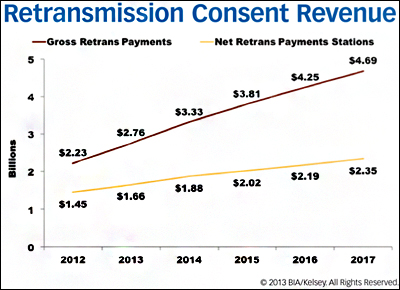For Broadcast Nets, Cable Path Is Twisty

The smarter way to stay on top of broadcasting and cable industry. Sign up below
You are now subscribed
Your newsletter sign-up was successful
RELATED: HowAereo Would(n't)Work in an Alliance With MVPDs
Chase Carey, president/COO of News Corp., last week set the
television world abuzz with talk about turning Fox from a broadcast network to
a cable channel.
At one time or another, though, the owner of each of the Big
Four nets has looked longingly at cable, with its two streams of revenue,
higher profit margins and freedom from FCC programming oversight.
The catalyst for contemplating a conversion now is Aereo,
the Barry Diller-backed streaming service that threatens millions in hard-won
retransmission payments that help keep big-ticket sports on the airwaves. The
broadcasters dragged Aereo into court, but so far it has withstood legal
challenges. But, as one veteran TV executive says, "this isn't about Aereo.
This is about the potential precedent that could be set by an adverse ruling on
Aereo" and the dominoes it could start to tip over.
Speaking at the annual NAB Show in Las Vegas on April 8,
Carey said he wants Aereo-and any cable operator who might emulate or buy its
technology for delivering broadcast signals to broadband customers without
paying the network-to know Fox won't sit by idly and revert back to being
dinosaurs in the TV jungle. Carey was quickly backed up by other network
chiefs, including Haim Saban, who controls Univision (and who might have a
wider range of buyers available if broadcast regulations didn't apply
Converting Fox, or any of the other broadcasters, to a cable
net would not be easy. "The challenge is not whether it can be done. It's how
long would it take to happen. It's not easy or quick," warns Wall Street
analyst Richard Greenfield, who believes that as long as Aereo is legal, "it
significantly changes the leverage imbalance that has dominated retrans
negotiations" that now favor broadcast.
Long before Carey threatened to play the cable card in
Vegas, Fox studied the model in 2008- 09. (Little-known fact: before News Corp.
got control of DirecTV, DirecTV boxes contained TV antennas. But outfitting
boxes with antennas is an expensive proposition.) A decade ago, NBC's Bob
Wright and Disney's Bob Iger flirted with the cable conversion idea in public
when they needed a way to get pesky affiliates back in line.
The smarter way to stay on top of broadcasting and cable industry. Sign up below
Fox's plan, as developed about four years ago, would have
moved the network to cable "with" its affiliates, making the change even more
complicated. The idea was to run locally originated programming, including
news, network and syndicated fare, over cable. The WB set up similar "virtual stations"
in markets where it couldn't get broadcast affiliates.
A drastic change from broadcast to cable has several pros
and cons:
The Pros:
Even the threat of a move creates leverage in retrans
negotiations.
Fox would be free from regulations over decency, obscenity
and obligations to do lower-rated, family-friendly programming.
It could cut costs at the stations. Running a transmitter
can cost a half-million dollars per year. Instead, Fox could reap a short-term
windfall by selling spectrum.
The Cons:
Lower ratings-10% to 15%-and lower ad revenue, according to
Sanford C. Bernstein analyst Todd Juenger, who figures the loss at about $200
million. If MSOs get avails in network programming as part of the shift, that
could increase competition for local ad dollars.
A converting network, Juenger says, would lose retrans and
reverse-comp revenue (though it could more than make it up from subscriber
fees).
New costs, to secure programming over cable rather than
broadcast throughout the entire day. Moving some sports to cable might create
problems with the public and the government. But one key supplier, the NFL,
indicated some support for Fox, saying in a statement: "We are committed to our
partnership with Fox."
And there is still more fallout. By broaching
the possibility of abandoning broadcasting, Carey might have opened a can of
worms by indicating to Washington that Fox doesn't need the valuable spectrum
it's been fighting to hold on to for so long. "This is a Pandora's box," one TV
executive said. He noted that suddenly the networks, stations, programmers and
distributors would have to renegotiate their relationships. Even if those
hurdles are cleared, there's still Washington. "Anytime you get government
involved, it's a three-sided sword: the public, election concerns and
politics," the exec said. -with Melissa Grego
Jon has been business editor of Broadcasting+Cable since 2010. He focuses on revenue-generating activities, including advertising and distribution, as well as executive intrigue and merger and acquisition activity. Just about any story is fair game, if a dollar sign can make its way into the article. Before B+C, Jon covered the industry for TVWeek, Cable World, Electronic Media, Advertising Age and The New York Post. A native New Yorker, Jon is hiding in plain sight in the suburbs of Chicago.

